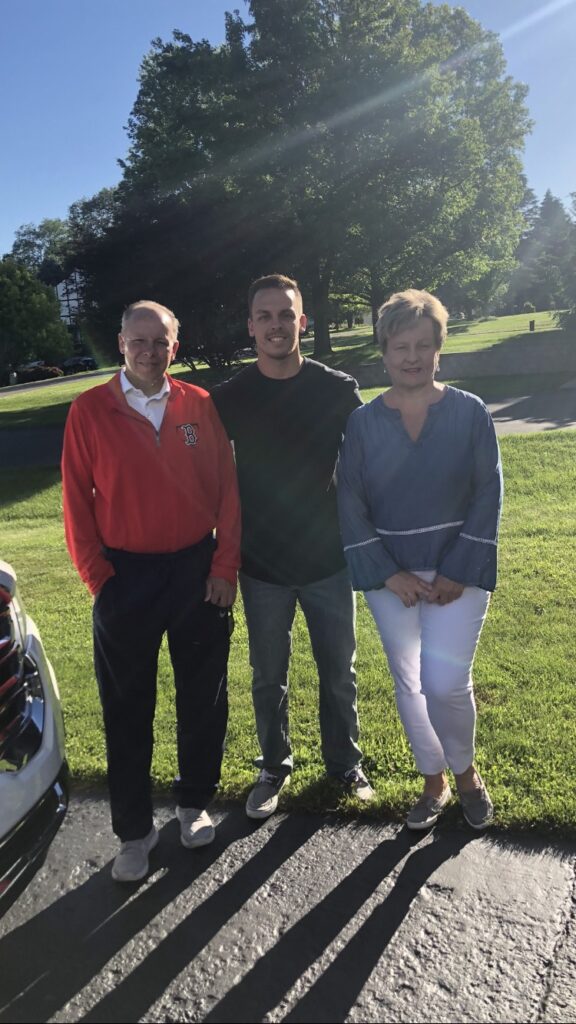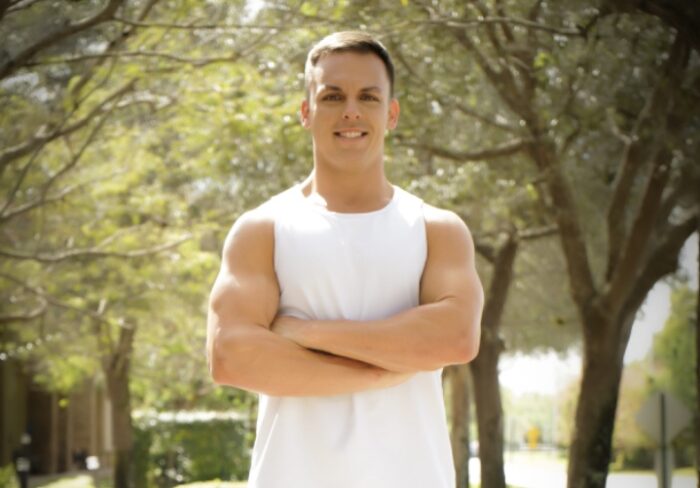There I was in the middle of a restaurant. I was just 8 years old and I felt the weight of this feeling pressing against me. It was as if the anxiety was choking out my ability to swallow. I kept telling my mom “I can’t swallow.” I became obsessed with the idea that I couldn’t feel myself swallow. I spent countless hours hyper-focusing on the action of swallowing.
It was as if one day something changed, suddenly I was aware of something I had paid little to no attention to previously.
I couldn’t tell you what it was about that specific time or day that brought this to the surface, just that it was there and it demanded my attention.
Perfectionism enters
After a while, the notice of my swallowing began to fade. I became very active in sports. Looking back on this time in my life I can see tiny ways in which OCD was at work in my life, even though I didn’t realize it at that time. I know that I was obsessed with certain things. I wanted to perfect my baseball swing. I recall spending hours looking at myself in the mirror. I would practice my swing, ensuring it looked just right. I didn’t see this as a problem, I just thought of myself as dedicated. I was trying to be successful, to be the best that I could be. If anything, I thought of it as a strength, I was a hard worker. I can see now that it was an obsessive-type mindset.
I was always outgoing, and friendly, not someone you would think struggles with anxiety or perfectionism. I was social and had a lot of friends. I made it through my school years pretty easily. It wasn’t until I started college that I started to struggle. I have since learned that this is a common time in an individual’s life when OCD either presents itself or worsens. It was my first time on my own, away from the familiarity of family and friends.
I felt trapped like I couldn’t escape from it. Everywhere I turned there were intrusive thoughts and feelings. I couldn’t explain what I was experiencing to anyone, at least that is how it felt at that time.
My main themes were sexual orientation or SO-OCD and health-themed OCD. There was a whole year at college in which I was focused on my body and how it looked. Not just focused but obsessed. There I was in my classes unable to concentrate. My mind jumped from topic to topic. I didn’t know what it was but unwanted thoughts bombarded my mind. Schoolwork became difficult. Relationships with friends and family could be strained. I had been in a long-term relationship with my girlfriend and struggling deeply with unwanted fears related to my sexual identity. What if I was fooling myself? How could I be sure I was really attracted to females? What if I was gay?
Constant nagging what-if thoughts entered my brain.
Yet, no one could see this inner turmoil. No one could see the pain, the confusion, the torment that these thoughts were causing me. I felt alone and like I had nowhere to turn. These thoughts held me back from doing so many things I could have been doing. It was hard for me to have male friends, I was terrified of having those types of thoughts around guy friends, so I avoided hanging out with them. It was a hard theme to escape from, everywhere you turn in society there are triggers.
Reaching out for help
It was after college and I had begun to adjust to life and find out my identity. I was spending more time obsessing than living my life. I was wanting better, wanting more out of life. I knew that I needed help. It was an extremely hard decision for me to make. I needed to choose to face my fears. I had spent years running from this, hiding it. I needed to admit that I was hurting. For years I had been pushing it down, not letting the feelings rise to the surface, pretending I was okay. It was time to admit that something was wrong and get help.

Leading up to this point, I had decided to talk to my girlfriend. I think that something clicked, I realized that what I was experiencing was not normal and that I needed to do something to change how I was feeling. I began researching what I was experiencing. I came across information on OCD and ERP. I found a specialist in my area. I was at a place in my life where I was ready to accept help. I was honest about my feelings and my experience. For the first time, I told the therapist everything I was experiencing. This specialist really started the journey of recovery with me. This is where I learned to overcome the fear of talking about my obsessions. I realized just how big the OCD was.
I didn’t realize how many people suffered from this condition and that I was not alone.
ERP was hard but not as hard as living with OCD all of those years had been. What helped me the most was applying ERP to my everyday life. Developing a plan to tackle the fears bit by bit was less intimidating. This allowed me to slowly take on the fears and not do too much too soon. I see myself as a very disciplined guy, I have a strong mind. Even with that, I still found ERP to be difficult, especially at first. Some people may not feel that they are very disciplined or strong mentally, but I want you to know that it’s okay, the more you practice ERP, the easier it gets. Nothing is as difficult as living life stuck in a cycle of OCD. You can do the difficult things that ERP asks you to do.
Don’t give up hope
Initially in therapy, I felt there were a lot of ups and downs. My progress seemed sort of all over the place. The more I was successful at it, the more confident I became and the more I wanted to do more. I feel fortunate that I was able to afford treatment. I know that there are many people who aren’t able to. I want to tell you that if that is you, it’s okay. Don’t give up hope. You can do some ERP on your own.
My advice to someone who is experiencing OCD and who thinks they are alone is to never give up. I am a big believer that everything happens for a reason and that one pinball move can place you on the right path. I would say, be vulnerable. I know it is so hard to talk about but it will be worth it. Calling OCD what it is, labeling and identifying it can be freeing in and of itself. ERP can be hard because it is going against what you want to do. It feels the opposite of what you want. It is doing the opposite in a sense of what OCD says.
You have to become okay with becoming uncomfortable.
I would tell the OCD sufferer to reach out to someone, anyone that you feel you can trust. This can be a friend, family member, teacher, or someone who you can trust. You don’t have to fight this alone. There is so much negative stigma surrounding mental health, don’t be afraid to speak up. The only reason I sought help when I did was that I finally opened up to someone I trusted. I allowed myself to be vulnerable and to share some of the darkest parts of myself. Just don’t stay in your own head.
It’s harder when you are younger, I think. I don’t even know fully what I would tell my younger self. I think that in today’s world we have come a long way. There are so many more resources available. There is a much more open and non-judgmental environment to have discussions surrounding mental health and care. More and more people are being educated and getting the treatment they need. There is still a lot of work to be done. But we are in a much better place today than when I was a child and experiencing OCD. Perhaps I would tell the younger me to ask for help sooner, allow people in, and don’t try to hide all of the suffering that you are feeling.
Giving back to the OCD community
Today I am 28 and living a life I truly enjoy. I attribute becoming an actor to having experienced OCD. OCD is all about being uncomfortable and so is acting. I think that everyone always points out the negative impact of having OCD (to which there can be many) but I also feel it should be stated that people with OCD have very unique minds. They have a strong mental capacity. I believe that if you can learn to harness these positives that it can be beneficial. I like to say, learn how to tame the best.
I reach out for support and help as I need it.
I think it is important that I don’t try and get reassurance from the outside world. I feel that this is helpful. I know when I need extra help and I seek it out when I need to. Faith and meditation have really helped me along the way. I try to constantly grow in wisdom. In general, having more wisdom, and being more rational in my thinking have all really helped me get to where I am currently in my OCD journey. The people close to me know that I have OCD and that I have a healthy support system. What is most rewarding though, for me is my work in the OCD community as a whole. I am part of NOCD’s Alumni program. Through the program, I am involved in the online NOCD app. Community. I provide support and responses to people in the community.
I feel that talking to others with similar experiences can be healing, I also think this helps me to stay healthy in my own recovery.
I also think that providing education on what OCD is and what it isn’t can be so influential. OCD can still be very misunderstood. I always laugh when I see how OCD is portrayed as “I am so OCD”, or when someone is organized and says “oh I am so OCD”. I just shake my head, and think to myself, oh you have no idea. Honestly, I encourage people to look it up and educate themselves. You never know when you could come across it. You can always learn. I like sharing about it because I think it is helpful for people to learn. I don’t think everyone suffers from OCD, even if they have tendencies. Symptoms or actions can be similar and some people may not even realize that they are suffering. Maybe I can help them recognize it and get better.

My advice is to be faithful and meditate. It calms your mind and brings your anxiety down. Anxiety is the main driver of OCD thoughts. Exercise. Work out when you can, that helps. If you are comfortable, tell your story, you never know whose life it may change.

